Overview
In the realm of software development, coding challenges are an ever-present hurdle that developers must navigate. How can these challenges be effectively tackled? Enter Kodezi, one of the ten AI test writing tools poised to revolutionize your development process. This tool stands out for its unique capabilities in automating testing processes, enhancing code quality, and streamlining workflows.
Kodezi not only addresses these common pain points but does so with a suite of features designed to boost productivity. Imagine significantly reducing the time spent on manual testing while simultaneously increasing the reliability of your code. By leveraging Kodezi, developers can experience a noticeable improvement in their workflow, leading to higher quality outputs.
Furthermore, Kodezi exemplifies the benefits of utilizing advanced AI tools in development. The efficiency gains are not just theoretical; they translate into real-world productivity increases, allowing developers to focus on what truly matters—creating innovative solutions.
Are you ready to transform your coding practices? Explore the various tools available on the platform, including Applitools and Selenium, each offering distinct advantages that can further enhance your development efficiency. Don't let coding challenges hold you back; embrace the future of software testing and development.
Introduction
In the competitive landscape of software development, the pressure to deliver high-quality code efficiently has never been greater. Developers face numerous challenges, from tight deadlines to the need for rigorous testing. How can they navigate this complex environment while maintaining productivity and code quality?
This is where Kodezi steps in, offering innovative solutions designed to streamline testing processes. With features that automate repetitive tasks and enhance collaboration, Kodezi empowers teams to focus on what truly matters—writing exceptional code. Furthermore, its intuitive interface allows developers to quickly adapt and integrate these tools into their existing workflows.
The benefits of using Kodezi are clear: improved productivity, reduced time spent on testing, and higher code quality. By automating tedious tasks, teams can allocate their resources more effectively, leading to faster development cycles and more reliable software. In addition, Kodezi's capabilities foster a culture of continuous improvement, enabling developers to refine their practices over time.
Are you ready to elevate your testing practices? Explore the cutting-edge AI test writing tools available on Kodezi's platform and discover how they can transform your development workflow.
Kodezi | Professional OpenAPI Specification Generator - AI Dev-Tool: Automate Testing and Code Maintenance
In the fast-paced world of software development, coding challenges can often slow down progress. Developers frequently grapple with the complexities of API documentation, which can be both time-consuming and error-prone.
Enter Kodezi, a powerful AI-driven tool designed to automate the generation of OpenAPI specifications. By integrating seamlessly with existing workflows, Kodezi addresses these challenges head-on, ensuring that your APIs are not only well-documented but also easily testable.
Imagine the productivity gains when your documentation process is streamlined! Kodezi not only saves time but enhances the accuracy of API specifications, leading to fewer errors during development and deployment. This means less frustration and more focus on delivering quality code.
Are you ready to elevate your coding practices? Explore the tools available on the Kodezi platform and experience the difference for yourself.
Testim: AI-Powered Test Automation for Rapid Development
Coding challenges can hinder productivity and lead to costly errors. Kodezi CLI employs artificial intelligence to enhance AI test writing, streamlining automation processes and empowering teams to develop and manage assessments swiftly and effectively. Its self-governing features enable B2B engineering groups to identify and resolve issues before deploying software to production, ensuring that evaluations remain relevant as the software evolves.
This adaptability not only accelerates the evaluation process but also significantly reduces the risk of broken tests. Imagine the peace of mind knowing that your development cycle is more resilient. By incorporating Kodezi's AI test writing along with automated builds and evaluations, teams can enhance code quality and optimize their CI/CD workflows.
Are you ready to elevate your coding practices? For a quick start, teams can explore the 5-minute quickstart guide and watch a demo to fully leverage Kodezi CLI's robust features. Don't miss out on the opportunity to improve your coding efficiency and quality!
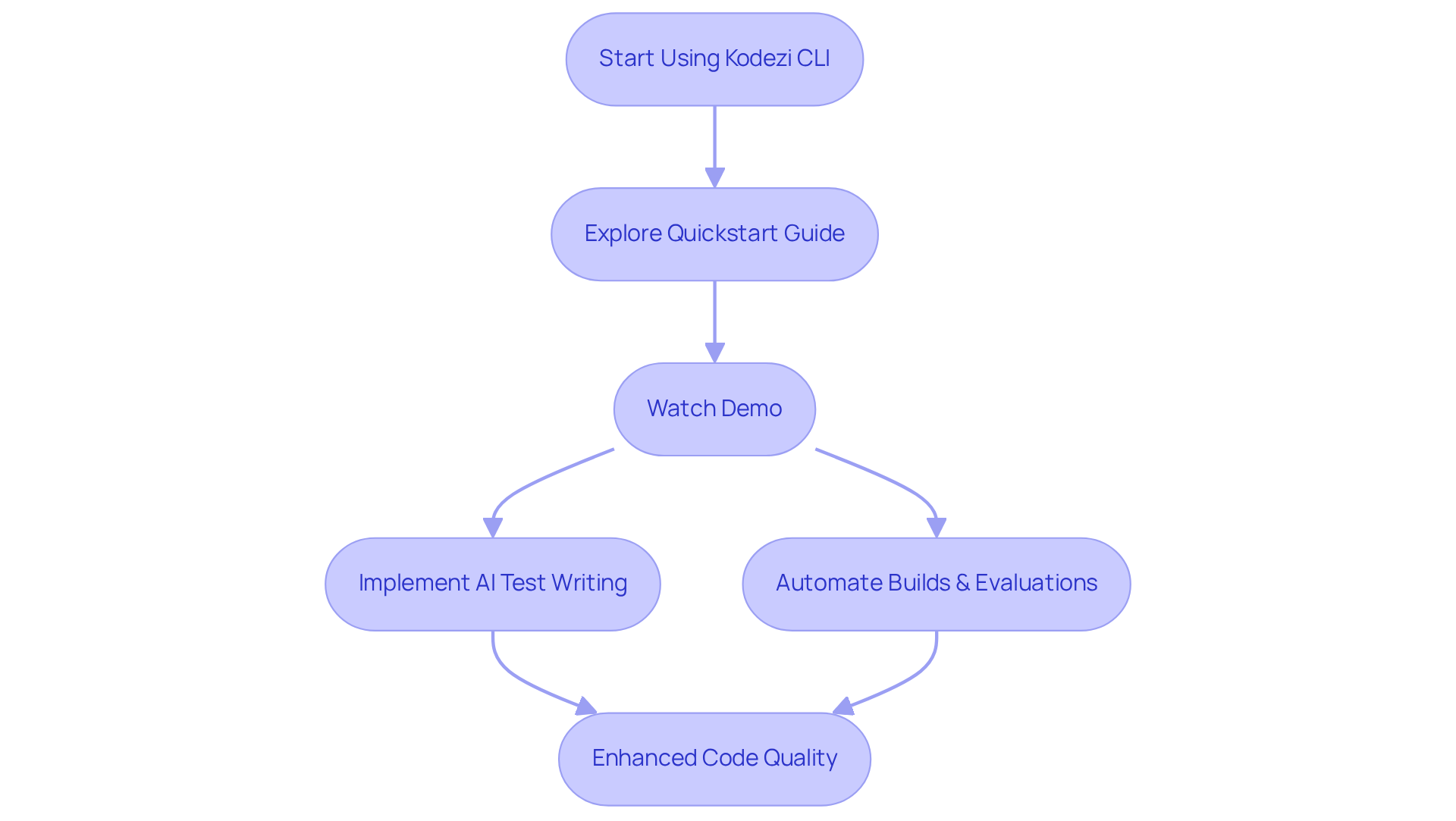
Applitools: Visual Testing for Consistent User Interfaces
In today's development landscape, ensuring user interface consistency across various devices and browsers is a significant challenge. Applitools addresses this issue with its visual evaluation platform, which automates the verification process. By capturing screenshots and comparing them against baseline images, Applitools effectively identifies visual discrepancies that could impact user experience.
This tool is particularly beneficial for teams that prioritize UI quality. It allows for rapid identification of visual bugs that manual evaluation might overlook. Furthermore, by streamlining the detection of these issues, Applitools enhances overall productivity and code quality.
Are you looking to improve your team's efficiency in UI testing? Applitools offers a solution that not only saves time but also ensures a high standard of visual quality. Explore the capabilities of Applitools and see how it can transform your testing processes.
Selenium: Open-Source Framework for Web Application Testing
In the ever-evolving landscape of web development, automating web applications presents significant challenges for developers. Enter Selenium, an open-source framework designed to streamline this process. It empowers developers to automate web applications for assessment objectives, supporting multiple programming languages such as Java, C#, and Python. This versatility makes Selenium an ideal choice for teams with diverse tech stacks.
Selenium's ability to mimic user interactions with web applications is a game changer. By enabling comprehensive evaluations of functionality and performance, it ensures that applications operate as expected in real-world situations. Furthermore, the framework's adaptability allows developers to tackle various testing scenarios efficiently.
Imagine the benefits of using Selenium—improved productivity, enhanced code quality, and the confidence that comes from thorough testing. This framework not only simplifies the testing process but also elevates the overall development experience. Are you ready to explore how Selenium can transform your approach to web application testing? Dive into the features and capabilities of this powerful tool and experience the difference for yourself.
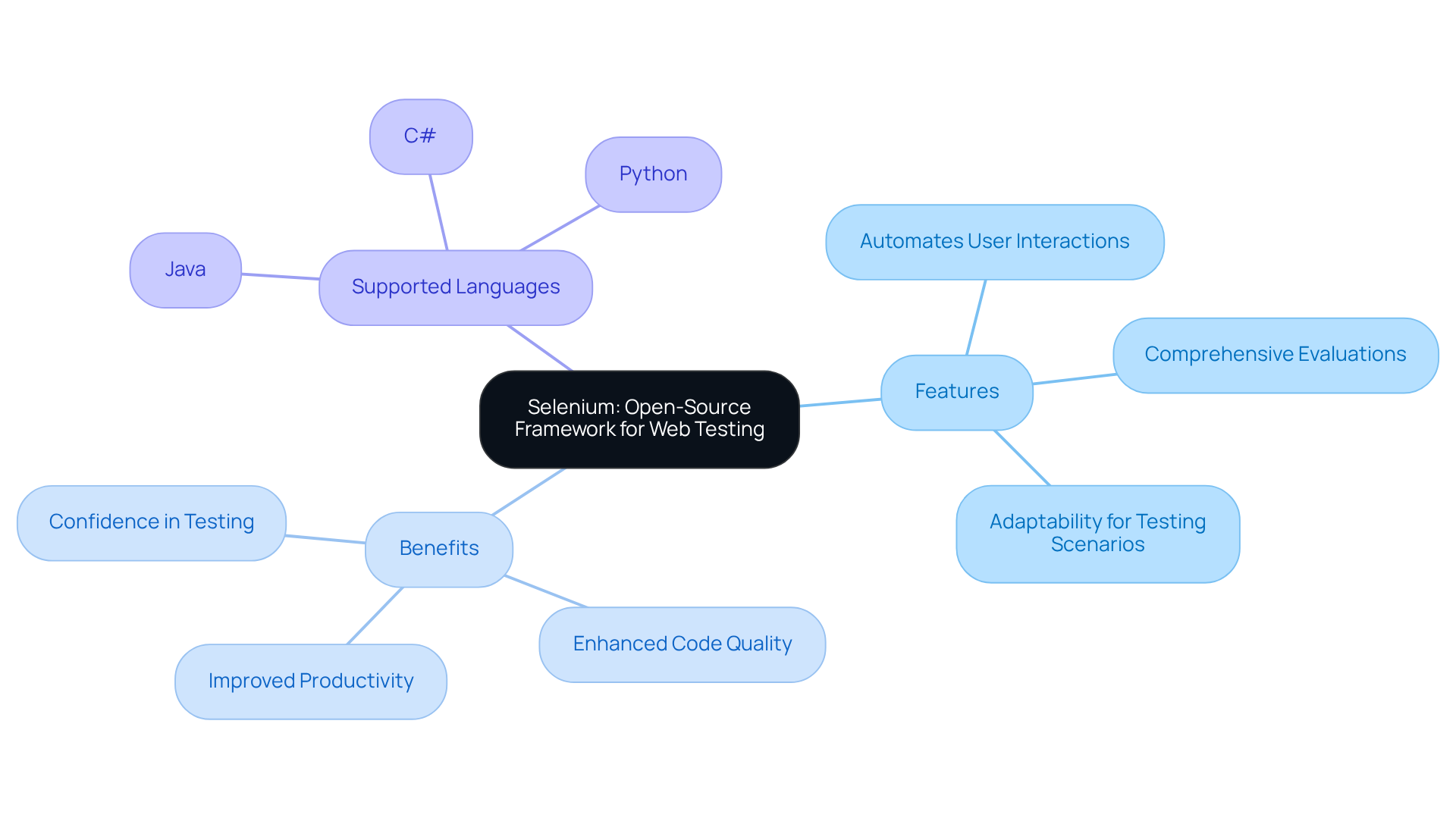
Cypress: Fast and Reliable Testing for Modern Web Applications
Coding challenges are a common hurdle for developers today. Fortunately, Kodezi offers innovative solutions to streamline the debugging process. Cypress, a contemporary framework, provides quick and dependable evaluations for web applications. Unlike conventional assessment tools, Cypress operates directly in the browser, enabling real-time reloading and debugging. This capability significantly accelerates the evaluation process, allowing developers to swiftly identify and resolve issues.
Furthermore, with Kodezi's automated code debugging, developers can instantly tackle codebase issues. This ensures that performance bottlenecks are addressed and security compliance is upheld, enhancing overall productivity. Cypress not only offers robust functionalities but also presents a user-friendly interface, making it an excellent choice for teams looking to simplify their evaluation efforts.
In addition, the integration of Kodezi with Cypress allows for a seamless workflow. Imagine reducing the time spent on debugging while improving code quality—this is the power of Kodezi. By utilizing these tools, developers can focus more on innovation rather than getting bogged down by technical difficulties. Why not explore the tools available on the Kodezi platform and elevate your coding experience today?
Postman: Comprehensive API Testing for Development Efficiency
In the ever-evolving landscape of software development, developers often encounter significant challenges when evaluating APIs. How can they ensure their APIs are functioning correctly and efficiently? Enter Postman, a robust tool designed to simplify API evaluation. With its intuitive interface, teams can easily send requests, examine responses, and automate tests, making the process seamless.
Postman boasts an extensive array of features that cater to the diverse needs of developers. It supports various authentication methods and allows users to create collections of requests. These capabilities not only streamline the testing process but also enhance collaboration among team members. Furthermore, with Postman, developers can ensure API functionality and performance throughout the entire development lifecycle.
The benefits of using Postman extend beyond mere functionality. By adopting this tool, developers can significantly improve their productivity and code quality. Imagine the time saved when tests are automated and responses are easily analyzed! This efficiency translates into faster development cycles and more reliable applications.
Are you ready to elevate your API evaluation process? Explore the powerful tools available in Postman and experience the difference it can make in your development workflow.
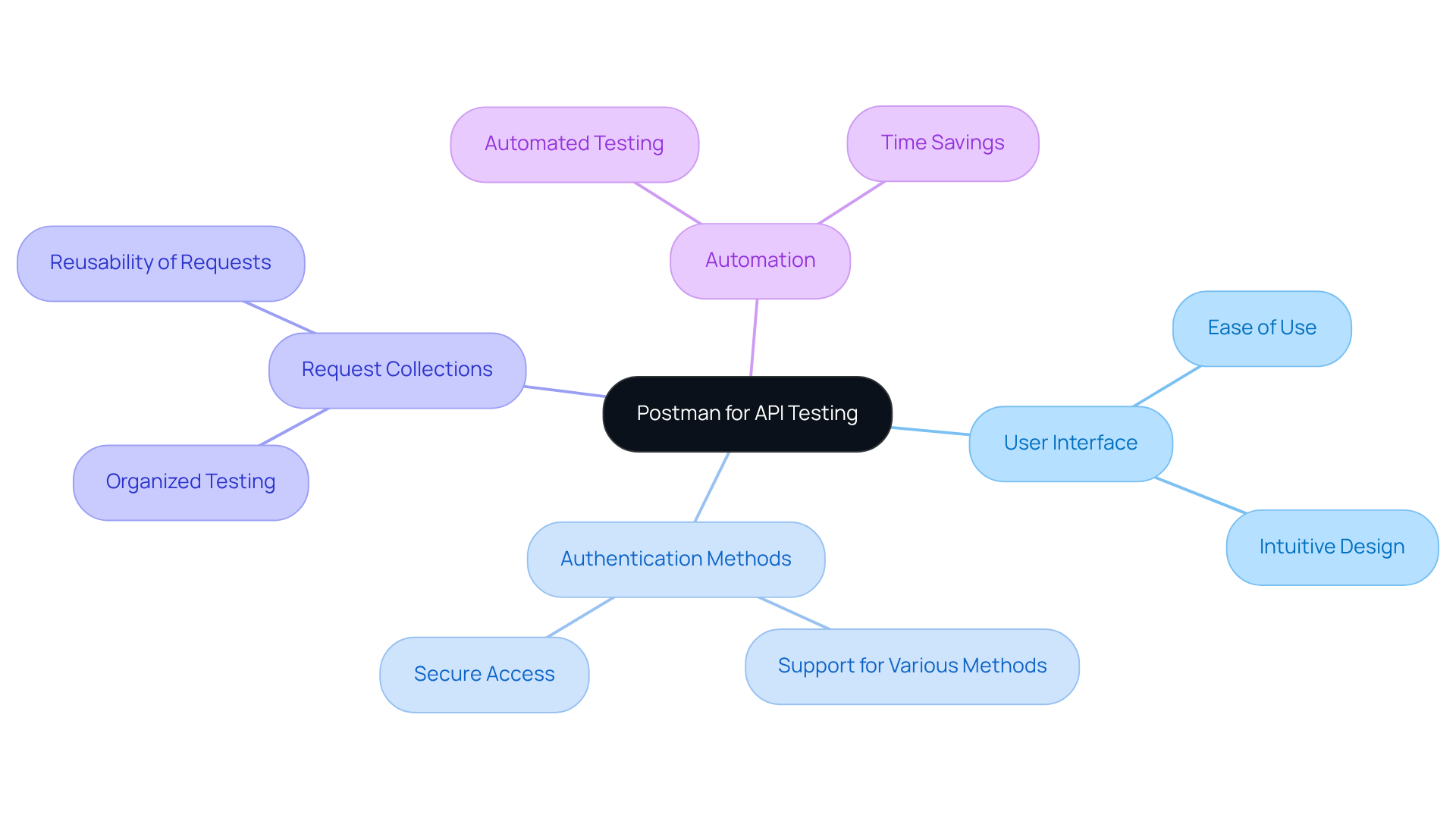
Katalon Studio: All-in-One Automated Testing Solution
Katalon Studio serves as an all-in-one automated solution that effectively supports evaluations across web, API, mobile, and desktop applications. This integrated environment allows teams to manage all assessment activities from a single platform, significantly reducing the complexity associated with using various tools. With robust features such as test case management, reporting, and integration with CI/CD pipelines, Katalon Studio stands out as an excellent choice for teams looking to enhance their testing efficiency and effectiveness.
Furthermore, for B2B engineering teams aiming to improve code quality and address issues before production, Kodezi CLI offers a complementary solution that aligns perfectly with Katalon Studio's capabilities. With Kodezi CLI, teams can start for free or request a demo to discover how it can streamline their development processes.
In addition, consider the potential benefits of adopting these tools:
- Enhanced productivity
- Improved code quality
- A more efficient workflow
Don't miss the opportunity to simplify your evaluation and development processes!
Robot Framework: Keyword-Driven Testing for Enhanced Collaboration
In the realm of software development, coding challenges can often hinder productivity and collaboration. Enter Robot Framework, a keyword-driven evaluation framework designed to foster cooperation among team members. By allowing non-technical users to actively participate in the assessment creation process, it addresses a common pain point in development teams.
With its straightforward syntax and extensive libraries, Robot Framework makes evaluations more approachable for everyone involved. This encourages increased participation in the assessment process, ultimately leading to a richer and more comprehensive evaluation experience. Furthermore, this cooperative approach not only enhances assessment coverage but also strengthens communication within the group, resulting in more efficient evaluation outcomes.
Imagine the impact of improved collaboration on your team's productivity and code quality. By leveraging Robot Framework, teams can streamline their assessment processes, making it easier to identify and address issues early on. In addition, the ability to engage non-technical team members can lead to fresh perspectives and insights that enhance overall project success.
If you're looking to elevate your evaluation processes and foster a more collaborative environment, consider exploring the capabilities of Robot Framework. Its user-friendly design and powerful features can transform the way your team approaches assessments.
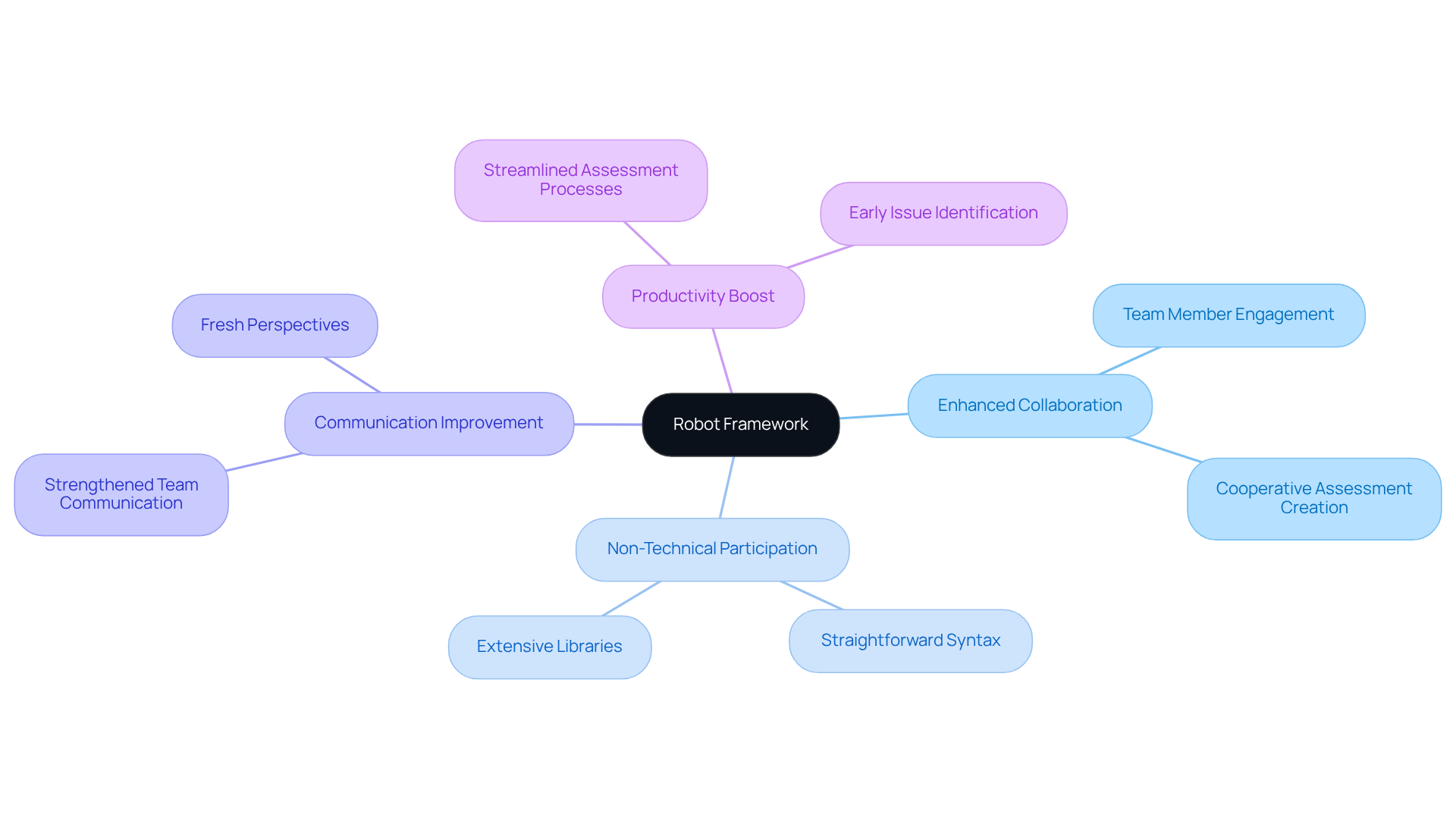
Jest: Simple and Effective Testing for JavaScript Applications
Developers often face significant challenges in ensuring their code is reliable and meets quality standards. Jest is a straightforward yet robust framework created specifically for JavaScript applications, designed to alleviate some of these challenges. Its zero-config setup and built-in test runner make it easy for developers to begin with evaluations.
In addition, Jest's functionalities, including snapshot evaluation and coverage analysis, assist teams in confirming that their software is operating properly and adhering to quality benchmarks. By integrating seamlessly with popular JavaScript libraries and frameworks, Jest enhances the overall development experience.
Furthermore, when paired with Kodezi's AI-driven automated programming debugging features, developers can view detailed explanations and insights into issues. This integration allows for performance optimization and ensures security compliance, ultimately leading to enhanced quality in software development.
Are you looking to improve your coding practices? Explore the tools available on the Kodezi platform to boost your productivity and code quality.
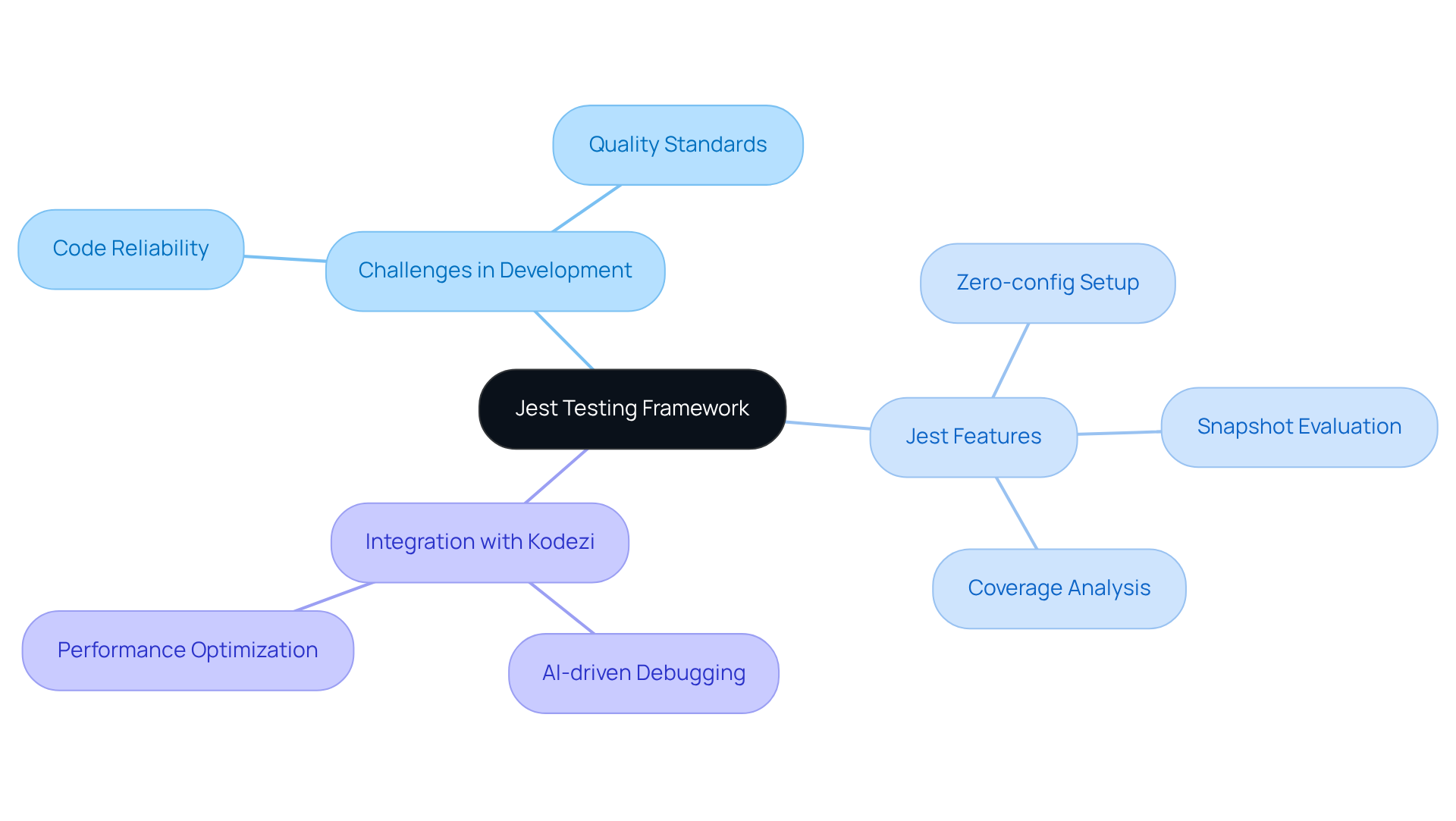
JUnit: Essential Testing Framework for Java Development
In the realm of Java development, coding challenges are prevalent. Developers often grapple with ensuring their code functions as intended. Enter JUnit, a crucial framework that provides a straightforward and efficient method for AI test writing and executing evaluations.
JUnit's annotations and assertions play a vital role in facilitating AI test writing, enabling developers to create unit tests that verify the functionality of their programs. This integration not only streamlines the AI test writing process but also allows teams to maintain high code quality. Furthermore, JUnit's compatibility with various build tools and IDEs enables quick identification of issues during development, leading to improved productivity.
Have you considered how implementing JUnit can enhance your coding practices? By adopting this framework, you can significantly reduce the time spent on debugging and increase the reliability of your code.
In conclusion, JUnit stands out as an essential tool for developers aiming to elevate their coding standards. Explore the features it offers and see how it can transform your development process.
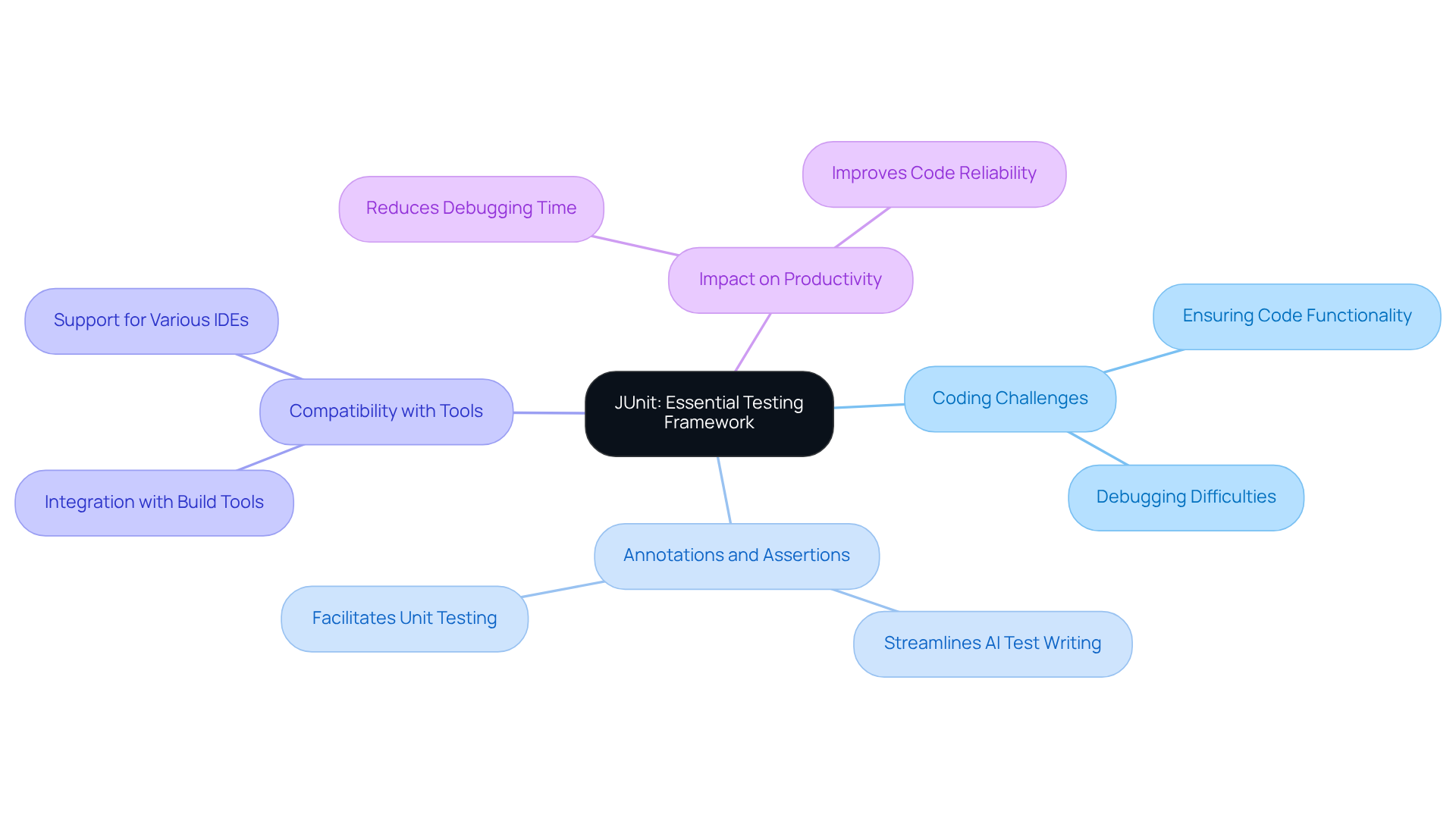
Conclusion
In the dynamic landscape of software development, coding challenges are an ever-present reality for developers. The integration of AI test writing tools has become essential for enhancing efficiency and ensuring high-quality code. By leveraging these innovative solutions, developers can automate testing processes, streamline workflows, and ultimately focus on delivering superior software products. Tools like:
- Kodezi
- Testim
- Applitools
- Selenium
- Cypress
- Postman
- Katalon Studio
- Robot Framework
- Jest
- JUnit
each offer unique features that cater to the diverse needs of development teams.
Kodezi stands out for its OpenAPI specification generation and automation of testing, addressing the common pain points developers face. Testim emphasizes rapid development through AI-powered test automation, while Applitools enhances UI consistency. Selenium provides a versatile framework for web application testing, and Cypress accelerates debugging. Postman simplifies API evaluations, Katalon Studio offers an all-in-one solution, Robot Framework fosters collaboration, Jest streamlines JavaScript testing, and JUnit ensures reliable Java development. Each tool contributes to a more efficient development cycle and improved code quality.
The significance of adopting AI-driven testing tools cannot be overstated. As the demands of software development continue to evolve, embracing these technologies not only enhances productivity but also fosters innovation. Developers are encouraged to explore these tools further, consider their unique benefits, and implement them into their workflows to transform their testing processes. The future of development lies in efficiency, accuracy, and collaboration—qualities that these AI test writing tools exemplify.
Frequently Asked Questions
What is Kodezi and what does it do?
Kodezi is an AI-driven tool designed to automate the generation of OpenAPI specifications, helping developers streamline API documentation and testing processes.
How does Kodezi improve productivity in software development?
Kodezi saves time and enhances the accuracy of API specifications, leading to fewer errors during development and deployment, allowing developers to focus more on delivering quality code.
What features does Kodezi CLI offer?
Kodezi CLI employs artificial intelligence for AI test writing, streamlines automation processes, and helps engineering teams identify and resolve issues before software deployment.
How does Kodezi CLI benefit B2B engineering groups?
It enables teams to quickly develop and manage assessments, ensuring that evaluations remain relevant as the software evolves and reducing the risk of broken tests.
What is Applitools and what problem does it solve?
Applitools is a visual evaluation platform that automates the verification of user interface consistency across different devices and browsers, identifying visual discrepancies that could affect user experience.
How does Applitools enhance productivity in UI testing?
By capturing screenshots and comparing them against baseline images, Applitools allows for rapid identification of visual bugs, improving overall productivity and code quality.
What resources are available for teams to get started with Kodezi CLI?
Teams can explore a 5-minute quickstart guide and watch a demo to leverage Kodezi CLI's robust features effectively.
Why is visual testing important for teams?
Visual testing is crucial for ensuring UI quality and consistency, helping teams to quickly identify and address visual issues that might be missed through manual testing.




